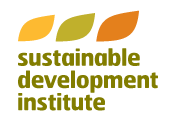
Citizens from forest communities in Grand Bassa, Gbarpolu, and RiverCess Counties have extolled the Sustainable Development Institute (SDI) and partners for providing them with insightful training on forest governance and gender mainstreaming.
After participating in the Six Regional Forum organized by the Sustainable Development Institute (SDI) under the consortium partnership with Client Earth implementing the project: “Building Legal Foundations for Sustainable Forests and Livelihood,” the participants committed to return to their respective communities to ensure that forest resources are used to holistically benefit their communities.
Aaron Mulbah, of Korninga “B” Community Forest Management Body (CFMB) was impressed by the knowledge-sharing and networking opportunities provided by the forum. He learned about mock arbitration, mainstreaming gender, roles of local authorities, and innovative approaches to forest management among others.
Upon returning to his community, Mulbah said he would immediately put his newfound knowledge into action.
Samuel Vonziah, Gbarsaw CLDMC chairman, committed that they will teach the role of local authorities in the community forest and will ensure men and women work together equally.
Esther Nathan of Zuzohn Authorized Forestry Community also assured that she and her colleagues will teach their people in a general meeting and also encourage working with local authorities.
Junior Wesseh of Gheegbarn #1 Authorized Forestry Community said, “We will teach gender in the community forest next season. We will also manage our community according to the Community Rights Law.”
Esther Kollie of Bondi Mandingo said, “We will increase women's participation in community forest and also create awareness to local authorities on their roles.” Through discussions and knowledge-sharing at the forum, communities learned about sustainable forestry practices that can help protect the forest ecosystem; while also meeting their needs for resources.
Charles Smith of the Ministry of Internal Affairs (MIA) said, although it was his first time attending the forum, he was pleased. He also acknowledged that the MIA plays an important role in community forest management. Madam Beatrice Boimah of the Liberia Land Authority (LLA) lauded the organizers and said the LLA encourages boundary harmonization. She however expressed frustration that traditional leaders are not giving them a chance, and they usually interrupt their work in the communities.
Caroline Crawford of Client Earth said, “The main focus of the program is to ensure that the legal framework for community forests is effectively managed. The first output is to ensure best practice on how you effectively manage your community forests governance, and the second is to ensure you have the legal tool to effectively use. My role here was to observe how the regional forum looks, and it interests me to meet you and hear about your different challenges, the different types of work that you go through, and the challenges that exist within your communities as well as the issues that you are facing and perhaps also hear about the opportunities.”
Jonathan W. Yiah of SDI, “We are happy to see you actively participating in this regional forum. There are lots of improvements in the communities. Let’s keep working for the good of the community.”
The forum was organized in collaboration with the National Union of Community Forest Management Body (NUCFMB), Foundation for Community Initiatives (FCI), and Heritage Partners and Associates (HPA).
Participants included representatives of the forest governing bodies; Community Assembly (CA), Executive Committee (EC) and Community Forestry Management Body (CFMB), members of the Community Land Development Management Committee (CLDMC) Forestry Development Authority (FDA), Liberia Land Authority (LLA) and the Ministry of Internal Affairs respectively.
The main objective of the Forum was to increase the knowledge and capacity of participants by sharing expert knowledge and experience on best practices on forest governance including transparency and accountability, roles and responsibilities leading to improvements in community forest governance, and exploring implications for policy and law reform.
